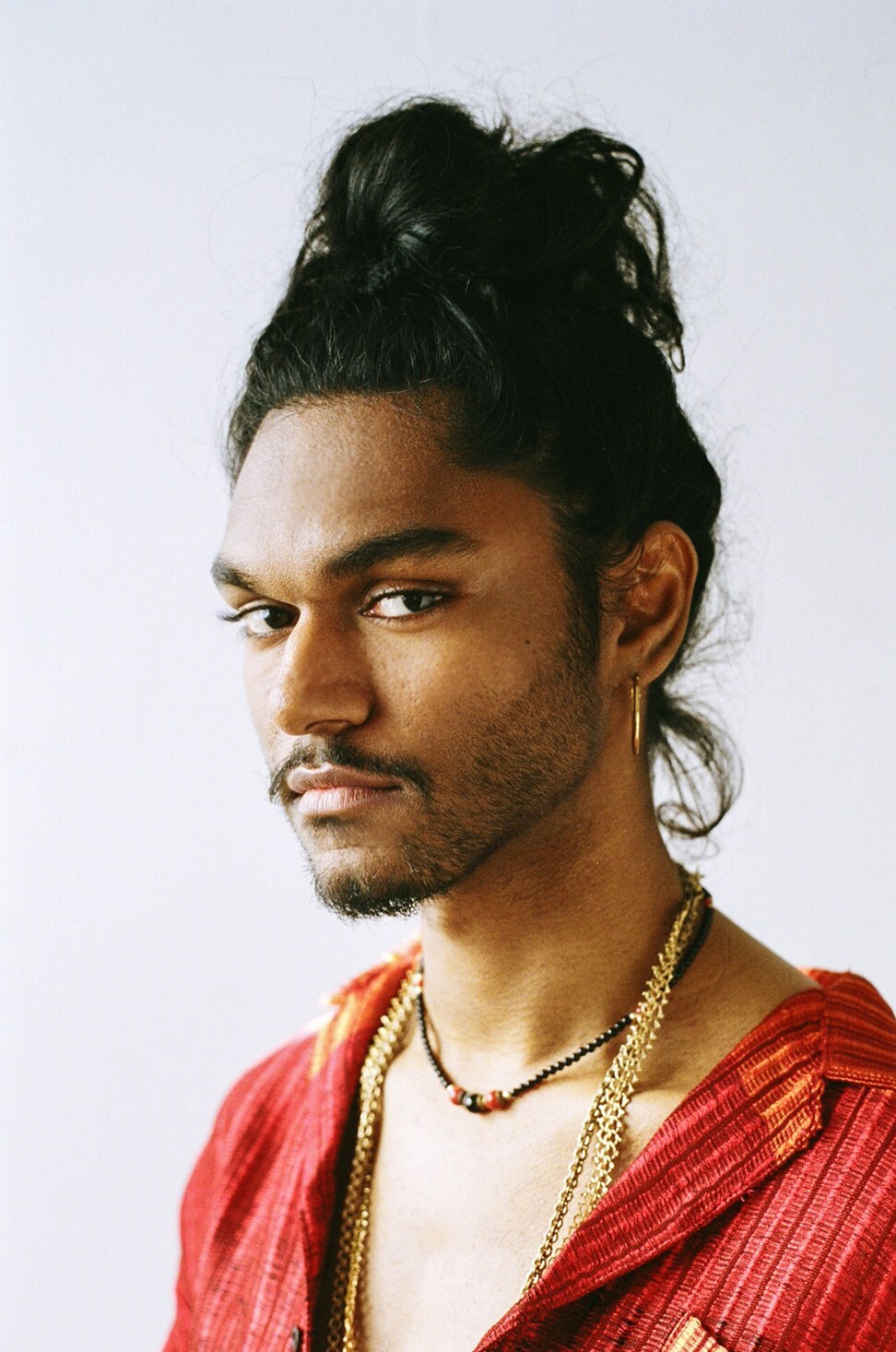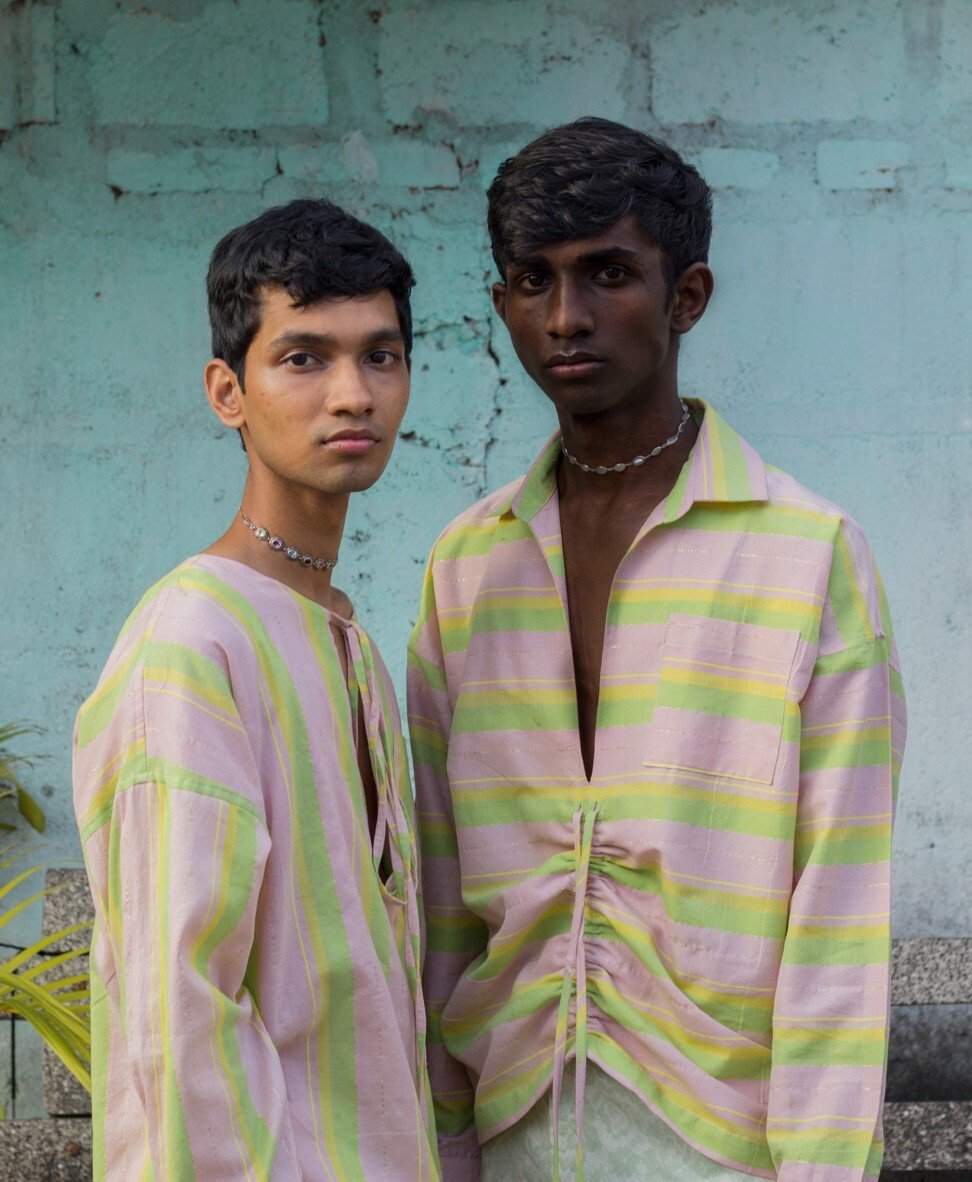
Pink isn’t just for girls: a designer big on gender inclusivity, Amesh Wijesekera brings florals, prints and skorts to men’s fashion
- Amesh Wijesekera’s newest collection, Flower Boys, is ‘a soft take on masculinity’ and an exploration of romance, intimacy and vulnerability
- The designer believes that his gender-inclusive label helps address the harassment and violence the LGBT community in Sri Lanka often faces
In a recent Instagram post, Amesh Wijesekera stands surrounded by tropical ferns, philodendrons and caladiums in his courtyard in Mount Lavinia, a suburban town in Colombo, Sri Lanka. His long hair is up in a messy bun, and he wears a hand-painted floral fuchsia long-sleeved shirt and matching trousers. It is, as he notes in his caption, “a full Amesh ‘flower boy’ look”.
“Clothes aren’t just items,” says Wijesekera via a WhatsApp call in October from Berlin, Germany. “Fashion is my fantasy world to express who I am. I can break boundaries here.”
Wijesekera, 27, was born in London but grew up in Sri Lanka by the beach. His love for design – from making clothes to gardening to interiors – comes from his mother. “My mother is very artistic, but her parents didn’t allow her to follow her passion. She ended up being a lawyer who doesn’t practise law,” says Wijesekera. “So she gave her children the full freedom to do what they love.”
Wijesekera went to a public school in Colombo. After he graduated, he enrolled in a four-year design degree at the Academy of Design (AOD) in Colombo. In 2015, he won the Student Graduate Industry Collaboration Award at the Mercedes-Benz Fashion and Apparel Awards, which gave him the opportunity to go to London.
In 2016, Wijesekera won the Oracle International Catwalk Competition at London Graduate Fashion Week. He showcased his collection at Fashion Scout (a display of design talent during London Fashion Week) in 2017, and secured apprenticeships with consultancy Future Laboratory and designers Edeline Lee and Zandra Rhodes.
Ayurvedic cosmetics are a thing – it isn’t just about medicine or food
The designer continues to make a name for himself – last year, he made his first appearance for his label at Mercedes-Benz Fashion Week in Berlin.
“I made 40 pieces in two months for the show,” he says, referring to his autumn/winter 2019 collection, brimming with colour and texture. The show pieces blend creamy golds with raspberry, crimson, and rust colours in a nod to his Sri Lankan heritage.

“I don’t understand why we are gendered even before we are born. When I go to men’s clothing stores, it’s always dark colours – black, navy blue or dark browns. Why can’t men wear pink or magenta?”
Wijesekera considers himself lucky to have been born into a family that gave him the freedom to express his queer identity and “embrace diversity”. It’s something that is not prevalent in Sri Lankan society.


None of this is new to Wijesekera, who can recall being bullied by his peers in school for being “less masculine” than the other boys. It is not uncommon for him to suffer sexual slurs and verbal abuse from rickshaw drivers. Earlier this year, while going for a run, he was beaten up by a group of men on Mount Lavinia Beach.
“We need broad, systematic change. Our schools teach us maths, science, and English, but they don’t teach us to respect others. They don’t teach us human development,” he says.
Wijesekera believes that his gender-inclusive label is helping to address the issue. “It’s creating an emotion. An impact,” he says.

“It’s a very intimate process,” he says, a reason he produces limited edition, handmade statement pieces (available at No Borders in India and 50m store in London). “I don’t want to lose the authenticity and intimacy by mass production,” he says.
Like many others, the designer’s work has been hampered by the global coronavirus pandemic. “I should be in Sri Lanka, working with my production unit for my next collection,” he says, “but I’m stuck in Europe.”
Of the future, Wijesekera says: “I want to collaborate with more artists from Sri Lanka.
“Fashion is changing. The future is about slow fashion and embracing inclusivity. People no longer want to just see designs from London, Berlin, Paris or Rome. They want to see elements from all over the world.”

